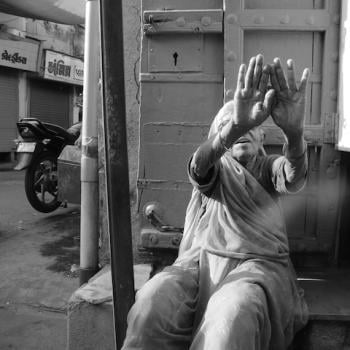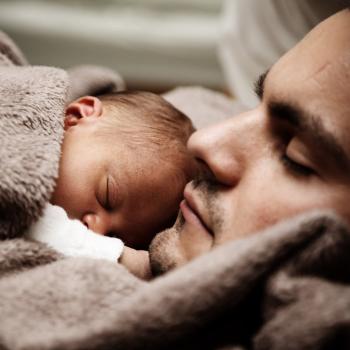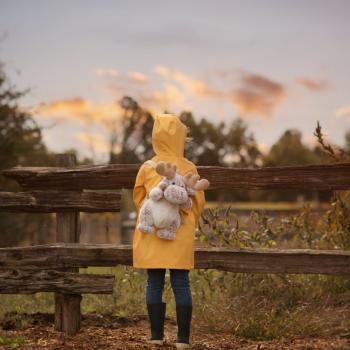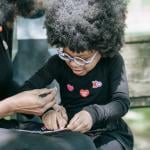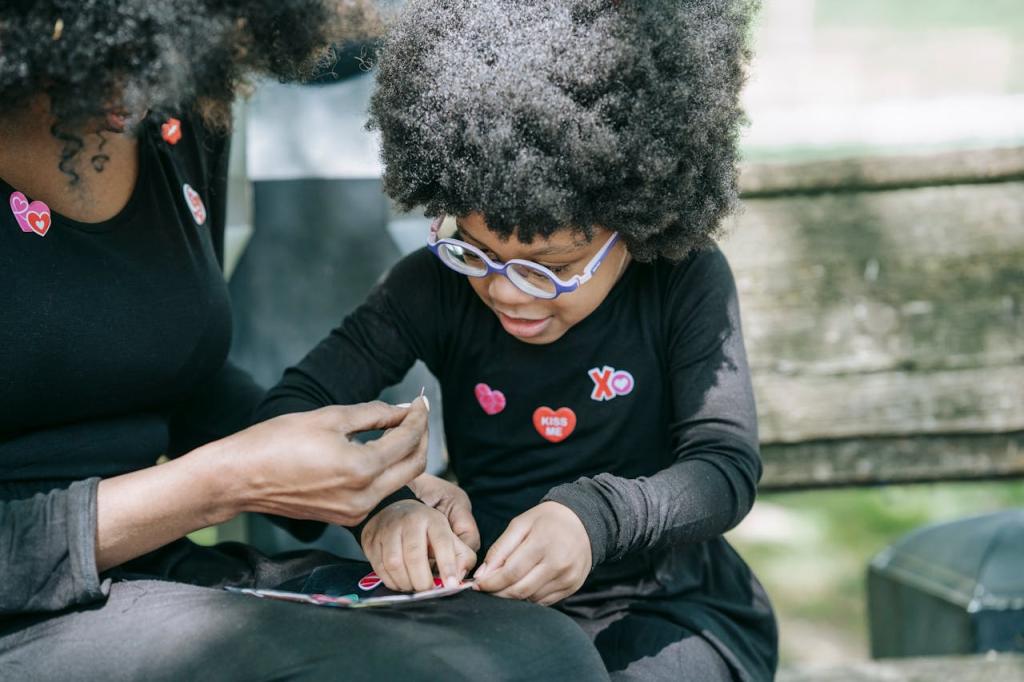
We Don’t Need a God, We Need People
Most stories about God begin much like the story I told myself and others.
I experienced a confusing set of circumstances in my life. I was treated badly, but there were some good people around me. I made both good and bad decisions, then realized I was missing something. I found Jesus, and He filled the hole in my heart, and now I want to help others realize the same thing. That’s my story.
We like to think there is a day of transformation when we were once lost and now, we are found. When we were blind, now we can see. But if we’re honest with ourselves, there wasn’t really a day when everything changed. That might have been the moment we started to change, but no one moves from deserving hell to being admired by heaven in just one instant. It wasn’t that an invisible being zapped us into holiness; it was more of a process. For 20 years, as a pastor, I observed the lack of evidence for such a claim. People don’t just change by becoming believers, and often, they change very little. They might change addictions, clean up a bit, and stop swearing, but that’s mostly influenced by peer pressure rather than anything deep.
Caregivers and Attachment
When we are born, we need the care of a caregiver. Usually, the mother is the primary caregiver, providing us with food, shelter, and later, guidance. We imitate our mother’s actions and bond with her as she helps create new connections in our brain, enabling us to grow and eventually care for ourselves. That’s the other thing our caregiver provides: attachment. What happens if we don’t get this?
BrightQuest Treatment Center offers this explanation.
Attachment trauma is a disruption in the important process of bonding between a baby or child and his or her primary caregiver. This trauma may be caused by overt abuse or neglect, or it may be less obvious—such as a lack of affection or response from the caregiver. Attachment trauma can occur if there are traumatic experiences in the home while a baby is forming the bond, and it may also result from the absence of the primary caregiver, such as due to divorce, serious illness, or death.
Without this attachment and care, a child can face serious consequences, and disruptions in this process can lead to trauma and challenges later in life. Often, we introduce the idea of God into the conversation to help ease some tension around this topic. However, mothers and caregivers who do not follow any deity regularly raise healthy, well-adjusted humans. I have also never heard of a situation where a mother abandoned her child, and God raised that child and provided for its attachment needs. If God exists, He either does not want to fulfill this role or is unable to do so.
Do we need God?
With a caregiver, we grow, mature, and begin caring for ourselves. If there is a God, we can still survive without believing in a specific God. People do it every day; they can even find a real connection by finding the right person, not the right God. When I became codependent on religion, I believed I needed it to feel emotions, challenge my intellect, and improve myself. But after my deconstruction, I realized it wasn’t religion or God that I needed; it was connection and attachment. Sure, we can find those in religion because it’s a community of people, but I argue there are much clearer ways to achieve that without the fuss and sometimes toxic aspects of our belief systems.
A good way to discover what you truly need is to take a year off, skip attending church, and refrain from praying to God. Don’t worry—if God exists, He can genuinely rescue you and will protect you. Use that time to build relationships rather than organizations, and you might even find genuine attachment and healing. You could develop a better understanding of God that can help you on your journey, or you might realize that you don’t need God at all. But you’ll never know for sure until you try. We don’t get a real attachment in church. The way we know this is when we don’t attend, the relationships die very quickly.
Even if my mother and I have issues, we have a more profound attachment than that.
Tomorrow is Sunday. Today, we picked cucumbers and tended to the garden. We did some cleaning, watched TV, and discussed important matters about our communication. We finished half of a 1000-piece puzzle and glued another one to hang on the wall. Tomorrow, we’re driving to pick up the grandkids, and Laura has plans for them. They will play and stay with us overnight. We’ll spend time together with my daughter’s family when they pick up the kids. We won’t need God to do anything this weekend; we need each other to connect, bond, and grow together.
Creation and a Needy God
If you say, “But God created you and gave you the ability to do all those things.” I respond, “Fine, but even if God provides the mechanism, it was me, my coaches, teachers, and parents who really made me who I am. I also had to work very hard after I got out of religion to repair the damage that religion had done.” If God exists and wants to join in, that’s fine, but I don’t need him. I’d prefer he didn’t because he gets in the way or gives me the silent treatment. I don’t have to give him money or listen to someone talk about him. I can listen to other music for free and get my dopamine rush by doing what works best for me. I don’t need a building to get better; I need people.
We don’t need a god; we need people.
For 8 years, we haven’t needed God, haven’t gone to church, haven’t given money to the church, and haven’t prayed to any being called God. Some things happened, and our mental health improved because we started counseling and practicing other things that helped us get better. We haven’t been re-traumatized by a church or Christians because we chose to connect with what is best for us!
But we still need people, so we are learning about the brain, how it works, and how trauma affects us. We volunteer at conferences where we learn even more about trauma and the brain, helping us to better support others. We spend time together, like we will be doing tomorrow, instead of going to church with people who wouldn’t hang out with us if we stopped attending.
We don’t need a god; we need people.
Consider one last story.
A boy whose parents abused him ends up in an orphanage. He struggles with life, goes to jail, and doesn’t “meet God,” but he meets a man who connects him with another man who employs ex-cons. After his release, the young man reconnects with him, gaining experience, wisdom, and real help through counseling and therapy. He begins to excel at carpentry and eventually starts his own business. Even if he finds religion, it’s the support and assistance he receives from people that truly make a difference.
If we understand that attachment and trauma awareness solve more problems than religion, we can eliminate all other elements of religion. We could redirect all the money spent on religion to create a nonprofit that helps people like him in every neighborhood. We could replace unnecessary things with essentials. Instead of pastors, church buildings, and worship services, we could develop programs that genuinely foster connection. Most of our practices could be substituted with mindfulness and meditation instead of prayer to a god that has communication issues.
What about spending time with people? My relationship with my family of origin and the suffering I endured during 20 years in the ministry were quite difficult. What if I had spent that time actually being with my extended and immediate family? What if we had focused on understanding how our brains work and how our trauma response systems activate, instead of studying the books of the Bible?
We don’t need a God; we need people.
Karl Forehand
Learn to be Where You Are (Presence)
Learn to be Who You Are (Authenticity)
Finding Regulating and Somatic Healing
Are you genuinely committed to deconstruction and seeking more profound answers?
If that’s the case, this book was created for you. As a former pastor, I made the mistake of deconstructing a bit and then trying to start something new, as I was trained to do. The problem with that approach is that I wasn’t ready to begin something new.

I hadn’t delved deeply enough or asked enough questions. The first stage of deconstruction typically includes assessing our beliefs regarding hell and the afterlife, supporting queer individuals and women in their fight for equality, and achieving a better understanding of racism and privilege.
Many people in deconstruction communities expend significant effort criticizing Evangelicals and attempting to gain a following. While I believe they deserve intense criticism, this strategy fails to effectively tackle the problem because they generally don’t listen to us!
Our tendency to punish our former organizations sometimes overlooks the challenging process of healing and growth. It is the same trap we fell into in our former associations.

Campfires occupy a special spot in the mosaic of history. They act as communal hubs across different cultures and faiths. The campfire’s circular design fosters equal participation within the collective group. The flames at the center draw our focus and encourage face-to-face interactions as we exchange experiences, wisdom, and insights about the world beyond. It is where legendary myths and tales are born.
Order Now – Study Questions in each chapter!
This book is named Campfires in the Desert as it stems from nearly 400 discussions we held with individuals on our podcast, The Desert Sanctuary, and our aspiration to improve.
Available now!
Thanks for considering us, autographed copies are $20
Karl Forehand Campfires in the Desert – A Soft Book Release. Karl Forehand is a former pastor, podcaster, and award-winning author. His books include Out into the Desert, Leaning Forward, Apparent Faith: What Fatherhood Taught Me About the Father’s Heart, The Tea Shop, and Being: A Journey Toward Presence and Authenticity. He is the creator of The Desert Sanctuary podcast and community. He has been married to his wife Laura for 35 years and has one dog named Winston. His three children are grown and are beginning to multiply! You can read more about the author here.




